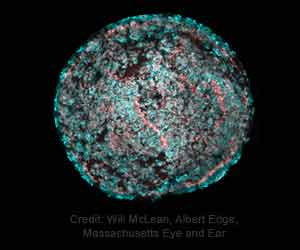Highlights
- Hair cells in the ear help to detect sound waves and hearing.
- Around 15,000 hair cells are present in the human ear during birth; these cells cannot be restored if it is damaged.
- A drug combination the can regenerate hair cells can help combat hearing loss.
Robert Langer, the David H. Koch Institute Professor at MIT, a member of the Koch Institute for Integrative Cancer Research, said, "Hearing loss is a real problem as people get older. It's very much of an unmet need, and this is an entirely new approach."
The research paper is published in the journal Cell Reports.
Regeneration of Cells
Around 15,000 hair cells are present per ear during birth. These cells cannot regrow when they are damaged.
Hair cell death can occur due to
- Noise exposure
- Aging
- Antibiotics
- Chemotherapy drugs
The scientists tried to study the effects of regenerating the hair cells on the cells of the intestinal lining. According to a study published in 2013, Karp, Langer, Yin said that large quantity of immature intestinal cells could stimulate them to differentiate and to expose them to certain molecules.
They wanted to try whether the approach would work in supporting cells and stimulate the Wnt pathway.
Yin, said, "We used small molecules to activate the supporting cells so they become proliferative and can generate hair cells."
The research team also exposed molecules which can activate another signaling pathway called Notch.
The research team was found to add another set of molecules into a large pool of supporting cells which have provoked cells that can differentiate into mature hair cells.
The procedure was found to generate 60 times more mature cells when compared to techniques that used growth factors to promote supporting cochlea cells to hair cells without expanding the population.
The research team also found that the new approach in an intact mouse cochlea can be removed from the body. They also did not add a second set of drugs as they were naturally exposed to signals which can stimulate them to become mature cells.
Karp, said, "We only need to promote the proliferation of these supporting cells, and then the natural signaling cascade that exists in the body will drive a portion of those cells to become hair cells."
Benefits
- Easy to administer in human patients
- Drugs can be injected into the inner ear and are commonly used for the treatment of ear infections.
Will McLean, said, "We hope that our work will allow other scientists to pursue studies of supporting cells and hair cells that have not been possible because such limited quantities of hair cells were available."
Karp, said, "Researchers who have been eager to conduct experiments on inner ear hair cells will now be able to replicate our work and have huge numbers of them to do all kinds of experiments."
The authors are also trying to use this approach in other types of cells which include intestinal cells that are involved in insulin regulation and control of gut microbiota.
References
- Will J. McLean et al. Clonal Expansion of Lgr5-Positive Cells from Mammalian Cochlea and High-Purity Generation of Sensory Hair Cells. Cell Reports, February 2017; DOI: 10.1016/j.celrep.2017.01.066
Source-Medindia















